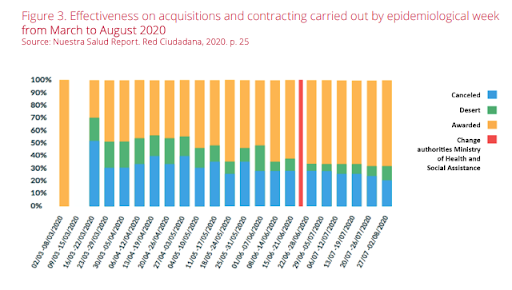Inclusive COVID-19 responses: What role can open contracting play?

Inclusive Responses to the COVID-19 Pandemic: The Role of Open Contracting – Read the Summary Paper, the Guatemala case study, and the Philippines case study.
When the COVID-19 pandemic began, governments around the world relaxed procurement procedures to expedite the acquisition of services and goods to respond to the crisis. In this context, we asked: How can open contracting principles, mechanisms, and processes be used to ensure that COVID-19 response and recovery measures are inclusive and protect the most vulnerable? The research builds on our previous work over the last three years exploring how opening up public contracting data and other data sets can contribute to the empowerment of communities habitually excluded from governance processes, and how disrupting existing data flows can potentially create value for marginalized groups.
We conducted two case studies in Guatemala and in the Philippines, which are priority countries for HIVOS, who commissioned the research. In Guatemala, exceptions to standard public procurement procedures were introduced under a “state of calamity” decree announced on 9 March, 2020. At the same time, new reporting requirements were established to ensure transparency and accountability. Several organizations made use of these reporting requirements to hold public institutions to account. This led to the detection of procurement irregularities, and even contributed to the resignation of senior government officials in charge of the government’s COVID-19 response.
However, during the early stages of the crisis, procedures or reporting requirements contained no specific provisions to encourage marginalized groups to participate in pandemic-related public procurement. Moreover, the additional funds allocated to the COVID-19 public health response came at the expense of providing primary care to Indigenous and rural communities at the district level. Despite non-governmental stakeholders’ efforts, there were bottlenecks in spending the allocated resources, purchases were concentrated at the central level, and many deals were cancelled or declared void, further disenfranchising marginalized populations.

In the Philippines, President Duterte signed an emergency decree (Proclamation No. 922) on 8 March 2020. The declaration facilitated faster access to emergency funding and relaxed procurement rules and processes, among other measures. The government initiated several support programs, mainly consisting of financial assistance, to ameliorate the economic and social effects of the lockdown measures. But the intended beneficiaries of some programs received little support. Marginalized communities or representative organizations did not participate in the planning and execution of the government’s recovery and response, leading to further exclusion.
Our research examined the efforts of one local government in detail: the City of Pasig, a highly urbanized city within Metro Manila that was lauded as having one of the best local government responses to the pandemic. The City has several processes that resulted in a more inclusive pandemic response, and marginalized communities have mentioned health procurement issues to city officials in conversations facilitated by governance advocates. However, in terms of procurement during the pandemic, inclusion was hampered by opaque processes and a lack of publicly available data.
What have we learned?
Analyzing the two cases, we highlight the following insights:
- During an emergency, differences in context, needs, and vulnerabilities of different groups of people are too easily overlooked.
- Lack of participation by people outside government in the design, implementation, and monitoring of initiatives to contain the virus and to mitigate the adverse economic impacts to citizens can lead to poor inclusion outcomes in COVID-19 response.
- Data and information are important components for a more effective and inclusive emergency response. Information provision is essential to enabling discussion, contestation, and productive collaboration, albeit not sufficient.
- Data intermediaries such as media, watchdog organizations, or social accountability advocates play an essential role in ensuring that procurement in a crisis is transparent, accountable and inclusive, by scrutinizing procurement processes and records.
Recommendations for promoting greater inclusion in public procurement
We distil three key actions that various actors should take in a crisis such as the COVID-19 pandemic:
- All stakeholders should always be mindful that emergencies such as COVID-19 impact different people differently and should ensure the response takes into account the different circumstances, location, and intersecting vulnerabilities of people, in particular by promoting participation of traditionally excluded and vulnerable groups at the planning stage.
- Governments should, from the very beginning of any crisis, make procurement data publicly available, with comprehensive and timely publication that allows for the tracking of procurement processes from advertisement to delivery.
- Governments, civil society, the media and other stakeholders, as part of a social compact, should cooperate from the very beginning of any crisis to ensure efficient and effective use of public resources in response to the crisis.
Transparency, co-operation, and intentional efforts for inclusion are needed for an equitable response to the crisis, and to provide marginalized communities with equal opportunity to benefit from the government’s measures.